31. Jan 2017
Europe’s five largest pension funds have €7.5 billion invested in companies with business activities in and around illegal settlements in the occupied Palestinian territories. This is at odds with United Nations guidelines, clear warnings from 18 European countries, and undermines the two-state solution, experts warn.
European investors have billions of euro invested in companies with activities in and around illegal Israeli settlements, according to a new investigation from Danwatch that screened the investment portfolios of Europe’s top five pension fund managers.
Statens pensjonsfond utland (Oljefondet) (NO), Stichting Pensioenfonds ABP (NE), Pensioenfonds Zorg en Welzijn (NE), Arbejdsmarkedets Tillægspension (DK), and Alecta Pensionsförsäkring (SE) have a total of €7.5 billion invested in 36 Israeli and international publicly-traded companies, most of which have long been under public scrutiny because of their activities in the occupied Palestinian territories.
Top five European pension funds
- Statens Pensjonsfond Utland (Oljefondet) (NO)
- Stichting Pensioenfonds ABP (NE)
- Pensioenfonds Zorg en Welzijn (PFZW) (NE)
- Arbejdsmarkedets Tillaegspension (ATP) (DK)
- Alecta Pensionsförsäkring (SE)
36 companies investigated
1. Africa Israel Properties
2. Alon Blue Square Israel Ltd.
3. Alstom SA
4. Altice NV
5. Azrieli Group
6. Bank Hapoalim BM
7. Bank Leumi Le-Israel BM
8. Bezeq The Israeli Telecommunication Corp Ltd
9. Caterpillar Inc
10. Cellcom Israel Ltd
11. Cemex
12. CNH Industrial NV
13. Delek Group Ltd
14. Electra Ltd/Israel
15. Expedia Inc
16. First International Bank Of Israel Ltd
17. G4S PLC
18. General Mills Inc
19. Gilat Satellite Networks Ltd
20. HeidelbergCement AG
21. Hertz Global Holdings Inc
22. Hyundai Heavy Industries Co
23. Israel Discount Bank Ltd
24. Jerusalem Economy Ltd.
25. Mizrahi Tefahot Bank Ltd
26. Motorola Solutions Inc
27. OSI Systems Inc
28. Partner Communications Co Ltd
29. PayPal Holdings Inc
30. Paz Oil Co Ltd
31. Phoenix Holdings Ltd/The
32. Priceline Group Inc/The
33. Rami Levy Chain Stores
34. Shufersal Ltd
35. Siemens AG
36. Volvo AB
Hugh Lovatt, expert on Israel and Palestine at the respected think-tank European Council on Foreign Relations, explains the problem with settlements:
“Israeli settlements in the occupied territories are illegal and have led to the dispossession of Palestinians and the fragmentation of Palestinian land. They infringe on Palestinian rights and exploit Palestinian natural resources.”
Business activities in and around settlements in the occupied Palestinian territories are not necessarily against the law, but according to the United Nations, investors are obliged to carry out enhanced due diligence and to demonstrate that their activities do not contribute to negative effects on human rights.
Full investigation
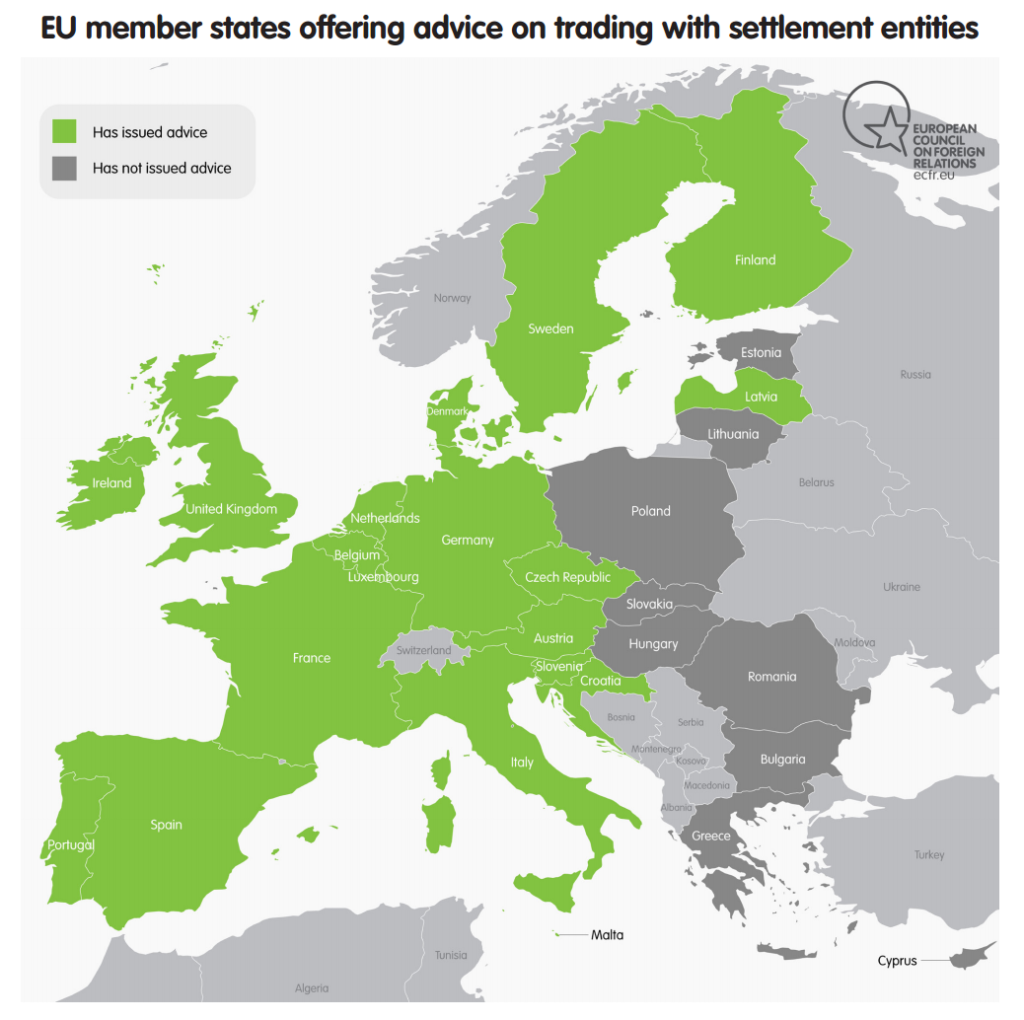
Overview from the European Council on Foreign Relations of the 18 EU countries (in green), which to date has published indicative warnings to citizens and businesses about the risk of legal, financial and reputational consequences of financial and economic activities in the settlements.
Warning from European governments
In addition, 18 European countries warn their citizens and businesses in no uncertain terms against undertaking financial and economic activities that could support illegal Israeli settlements.
“Financial transactions, investments, purchases, tenders, and other economic activities (including services like tourism) in Israeli settlements or benefiting Israeli settlements are associated with legal and economic risks due to the fact that, according to international law, the Israeli settlements are built on occupied land and are not recognised as a lawful part of Israel’s territory,” wrote the Danish Foreign Ministry in a 2014 statement similar to statements published by other countries.
“One should also be aware of possible violations of international humanitarian law and human rights,” the statement warns and refers to OECD Guidelines for Multinational Enterprises (2011) and United Nations Guiding Principles on Business and Human rights (2011).
Undermining the two-state solution
In addition to the “increased risk of adverse human rights impacts”, as the UN puts it, European investors are also actively undermining the official policy of the EU regarding a two-state solution to the Israeli-Palestinian conflict.
When European investors finance, fund or facilitate the settlement enterprise and illegal actions in the occupied Palestinian territories, they are contributing to the undermining of the two-state solution and therefore the undermining of the EU’s own foreign policy objectives,”
Hugh Lovatt, Policy Fellow at the European Council on Foreign Relations
“And these investments are illegal under international law – or at least very problematic – and exposes European investors to reputational, financial and legal risks,” says Lovatt.
Investments in companies with business activities in and around settlements tie European investors to potential violations of international humanitarian law and Palestinians’ human rights.
Lars Erslev Andersen, a senior researcher at the Danish Institute for International Studies (DIIS), agrees that it is problematic when companies have activities in settlements.
“In my opinion, businesses that have branches or factories in the occupied Palestinian territories help to maintain the occupation and facilitate Israel’s continued construction of settlements, infrastructure and security apparatus in the West Bank,” Andersen tells Danwatch.
This is problematic, because it undermines the two-state solution, which is gradually becoming an illusion for a great number of people,
Lars Erslev Andersen, senior researcher at DIIS
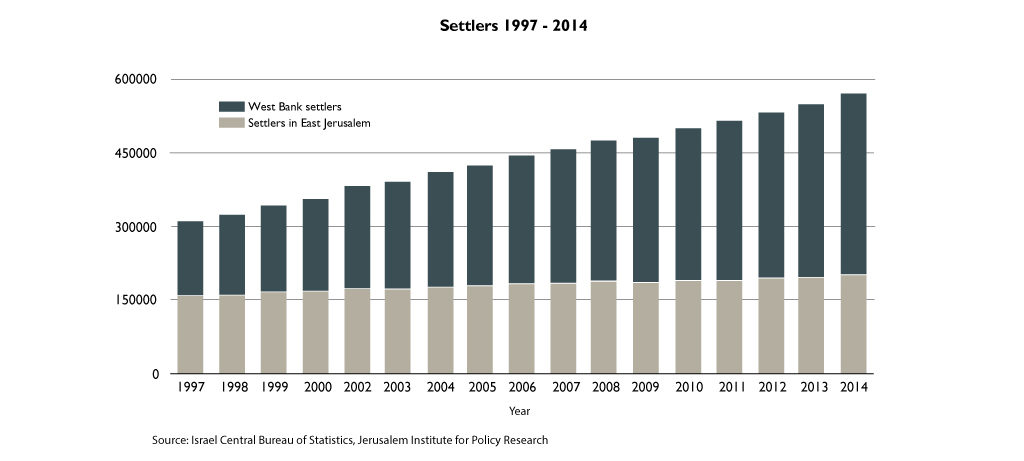
FACTS: Settlements
Shortly after the capture of the West Bank and Gaza in 1967, Israel began to build settlements and move its civilian citizens into the occupied Palestinian territories. Today, fifty years later, nearly 600,000 Israeli civilians live in occupied areas of East Jerusalem and the West Bank. The settlements in the Gaza Strip were vacated in 2005.
Some settlements are regular towns, while others are little more than a few shacks on a hilltop deep in the West Bank. There are 131 settlements officially recognised by the Israeli government in all. In addition, there are 97 “outposts”, smaller settlements that are illegal according to Israeli law.
According to international law, both the recognised settlements and the outposts are illegal.
United Nations Security Council Resolutions 242 (1967) and 338 (1973) require that Israel withdraw from the occupied territories. This position has not changed in the intervening years, and is shared by almost all countries in the world.
Israel, as the occupying Power in the Occupied Palestinian Territory, is bound by international human rights law and international humanitarian law, including as contained in international customary law. In particular, Israel is bound by the Geneva Convention relative to the Protection of Civilian Persons in Time of War (Fourth Geneva Convention) and the Hague Regulations.
Specifically, an occupying power shall not deport or transfer parts of its own civilian population into the territory it occupies, according to article 49 of the Fourth Geneva Convention.
The Security Council, the General Assembly, the Human Rights Council and the International Court of Justice have all confirmed that the construction and expansion of Israeli settlements and other settlement-related activities in the Occupied Palestinian Territory are illegal under international law.
The first settlements were established under the sitting left-wing government in 1967, immediately after Israel’s conquest of the West Bank from Jordan in the Six-Day War.
This was despite the fact that the Israeli government’s own legal counsel, Theodor Meron, concluded that the establishment of settlements in the West Bank and the Golan Heights contravened international law.
Every Israeli government since – irrespective of party affiliation – has supported the policy of settlements and has expanded the number of civilian Israelis living in the occupied territories.
Norwegian fund biggest investor
The largest single investor by far is Statens Pensjonsfond Utland, the Government Pension Fund of Norway, with €5.2 billion out of the total €7.5 billion invested in all 36 companies on Danwatch’s list.
This includes €135 million in Caterpillar, which supplies bulldozers for the demolition of Palestinian homes in the occupied territories; €286 million in HeidelbergCement, which has been blacklisted by several other European investors due to exploitation of Palestinian natural resources; and €1.5 billion in Siemens, which has installed traffic systems on Israeli roads in the West Bank and placed bids on projects on occupied territory with Israel Railways.
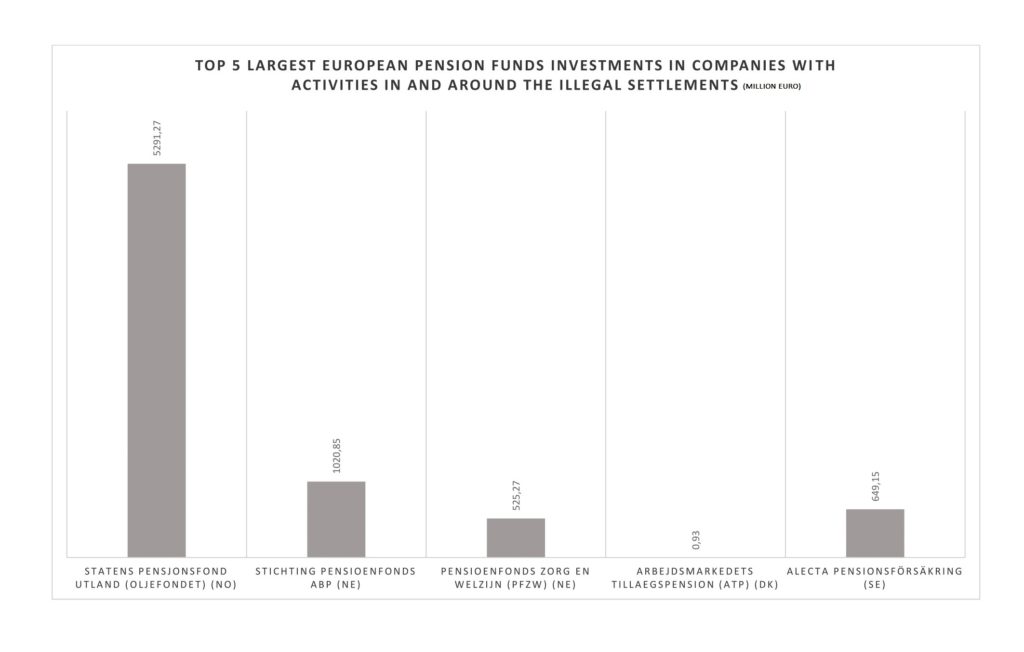
The Norwegian Government Pension Fund also has €233 million in five Israeli banks financing settlement construction and operating in the West Bank in various ways: Bank Hapoalim, Bank Leumi, First International Bank of Israel Ltd, Israel Discount Bank Ltd and Mizrahi Tefahot Bank Ltd.
These same banks are blacklisted by Europe’s third largest pension fund Pensioenfonds Zorg en Welzijn (PFZW) (NE) which in 2014 ended several years of dialogue.
“Given the day-to-day reality and domestic legal framework they operate in, the banks have limited to no possibilities to end their involvement in the financing of settlements in the occupied Palestinian territories,” wrote PFZW (formerly PGGM) about the decision to divest from Bank Hapoalim, Bank Leumi, First International Bank of Israel, Israel Discount Bank and Mizrahi Tefahot because they finance settlements and operate branches on occupied territory.
Danwatch asked The Norwegian Government Pension Fund specific questions about each of their investments in the 36 specific companies, but received no specific reply. Instead the fund answers in general terms about how they expect companies they invest in to strive to observe “the G20/OECD Principles of Corporate Governance, the OECD Guidelines for Multinational Enterprises, and the UN Global Compact.”
“Our expectations are especially relevant for companies with direct operations, supply chains or other business relationships in high-risk sectors, high-risk geographical areas, or otherwise high-risk operational environments,” they explain.
The Norwegian oil fund’s decisions about excluding specific companies is regulated by an independent council appointed by the Norwegian Ministry of Finance.
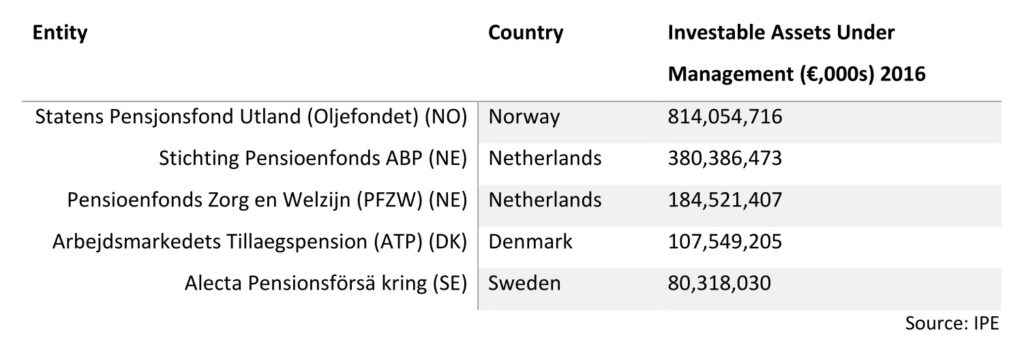
New findings will be considered
Of the five largest European pension funds, Denmark’s ATP is by far the smallest investor in companies on Danwatch’s list, with about €1 million in total in Siemens and The Priceline Group Inc, the owner of booking.com, which facilitates hotels in a number of settlements. However, ATP’s publicly available stock portfolio does not include index futures, which amounts to almost 95% of ATP’s entire foreign holdings.
On the two specific investments, ATP explains that Danwatch’s findings includes new information not covered by their external screening partner, and that they will have to consider this before they can answer specific questions.
Sweden’s largest pension fund, and Europe’s fifth-largest, Alecta Pensionsförsäkring, only has investments in one company on Danwatch’s list: Volvo Group. The Swedish industrial conglomerate partly owns Merkavim, which provides armoured busses for Egged bus lines in the West Bank, where Volvo busses are also used for transport. Two Volvo-certified garages operate in the illegal industrial zones of Mishor Adumim and Atarot in the occupied West Bank. Furthermore, Volvo excavators are used by the Israeli army to demolish Palestinian houses on occupied land, as documented in February, April and October 2016 in the Palestinian villages of Jinba, Halaweh, Um Al Kher and in the Jordan Valley. Danwatch presented these findings to Volvo Group, but received no reply.
On the subject of house demolitions, Volvo Group stated in 2011 that “Volvo neither can nor wants to take a position in international conflicts […] We regret if they are used for destructive purposes, but it does not stop us from believing that our excavators and vehicles largely play a part in making the world a little better.”
Alecta Pensionsförsäkring explains to Danwatch that their due diligence is outsourced to external partner GES, and that GES confirm their knowledge about the issue and have concluded that Volvo Group’s activities is not a breach against international conventions.
“Volvo has limited possibilities to influence how their products are used and we believe that Volvo cannot be directly linked to human rights violations,” Swedish investor Alecta therefore tells Danwatch.
“Alecta has an active and ongoing dialogue with Volvo as well as with our external partner GES and has so far not received any indication pointing towards an exclusion. If necessary we will as a first priority engage further in our dialogue with Volvo to make them comply with international law, rather than exclude them as an investment,” Alecta says.
Danwatch also contacted the two Dutch pension funds Stichting Pensioenfonds ABP and Pensioenfonds Zorg en Welzijn (PFZW), but received no reply.
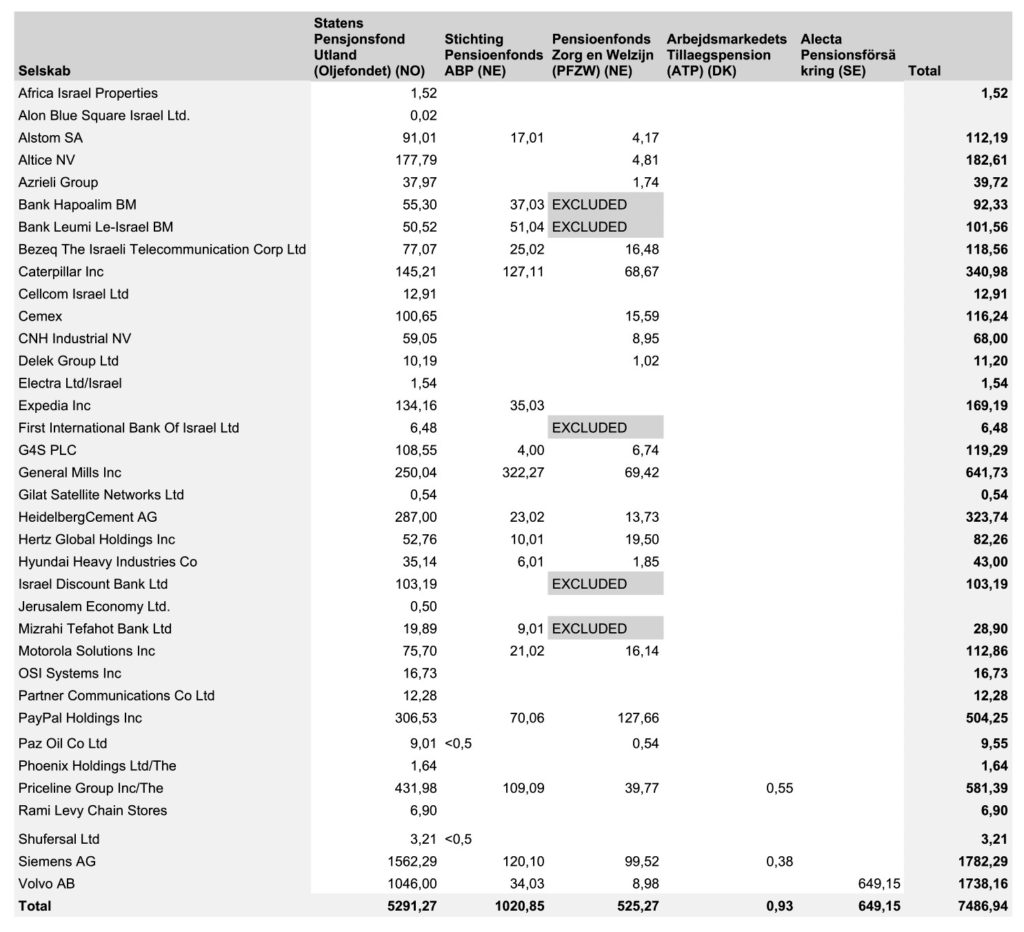
Read the full investigation here:
BUSINESS ON OCCUPIED TERRITORY
Follow-up investigation
This investigation is the latest installment in Danwatch’s series called “Business on Occupied Territory”. As in the earlier investigations into Danish investments in 2012 and 2014, Danwatch has identified a number of publicly-traded companies associated with illegal settlements, the separation wall, checkpoints, or the exploitation of natural resources in occupied Palestinian areas.
These include Israeli banks that finance settlement construction; the Mexican cement company Cemex, which operates three factories in the West Bank via an Israeli subsidiary; and the American technology firm Motorola, which supplies security solutions to settlements. The 36 companies on Danwatch’s list all help support illegal settlements, checkpoints or the separation wall via business activities in various ways. Some of these companies have actual addresses in settlements, pay tax to settlement authorities and create jobs, while others supply critical services or have direct agreements or contracts with parties that clearly and systematically violate human rights or international humanitarian law.
Danwatch has identified a total of 36 companies with investments from the top five European pension funds. Nineteen are Israeli, eight are American, and others are German, French, Swedish, Italian, Korean, and Mexican.
How we investigated
- Danwatch prepared a list of publicly listed companies that cause, contribute to, or are directly linked to violations of human rights or international humanitarian law in the occupied Palestinian territories, as described in UN Guiding Principles on Business and Human Rights.
- Danwatch obtained stock portfolios of the five largest European pension funds and screened these stock portfolios for investments in companies we had identified as problematic.
- Danwatch sent specific questions to investors to comment on.
- Danwatch interviewed sources and collected documentation in the West Bank regarding the companies whose activities have been connected to violations of human rights. On the basis of this material, we selected two case histories: Israeli banks and Cemex.
- This investigation is a follow-up to previous ones conducted by Danwatch on the same subject in 2012 and 2014, but with a broader focus and with additional companies under scrutiny.
Selection of companies with potential negative effects on human rights
- Danwatch has prepared a list of publicly traded companies that cause, contribute to, or are directly linked to violations of human rights or international humanitarian law in the occupied Palestinian territories.
- The list includes Israeli and multinational corporations that are present physically on occupied lands without the consent of the occupied communities, as well as companies that have direct agreements or contracts with parties that violate human rights or international humanitarian law, especially in connection with illegal settlements, the separation wall, checkpoints, or the extraction of natural resources.
- We have chosen to focus on companies that have clear negative effects on human rights, thereby declining to examine a long list of companies with weaker and more peripheral connections, even though these companies’ activities and behaviour can still be characterised as having negative effects on human rights.
- All the companies on Danwatch’s list have been given the opportunity to comment on the results of our research.
- Danwatch’s list of companies is a snapshot in time that was created in Fall 2016. It therefore includes only companies that are involved in ongoing or recent negative effects on human rights.
Screening methods
The largest European pension funds were identified by the size of the assets they manage. This information is found in Investment Pension Europe’s “IPE Top 1000”.
PORTFOLIO PENSIONFUNDS:
Alecta: December 31, 2015
ATP: June 30, 2016
Oliefondet: December 31, 2015
Pensioenfonds Zorg en Welzijn (PFZW): December 31, 2015
Stichting Pensioenfonds ABP: September 30, 2016
Corporate responsibility in the occupied territories
Corporate responsibility under a belligerent occupation is a difficult subject for companies and investors to navigate. Here is a guide to the responsibility of businesses with connections to activities in and around settlements on occupied territory.
Danwatch uses international humanitarian law and the United Nations Guiding Principles on Business and Human Rights (UNGP) as the point of departure for its investigation.
International humanitarian law – also known as the law of armed conflict – is codified in the Geneva Conventions of 1949.
The Geneva Conventions protect civilians in conflict zones and under military occupation, and prohibit torture, collective punishment, and the transfer of an occupying power’s own civilian population into occupied territory. Israel has signed and ratified the Geneva Conventions, which apply in the occupied Palestinian territories.
What are the UN Guiding Principles?
The UNGP build on international humanitarian law and international human rights, and offer clear guidelines regarding the responsibility of companies to prevent violations.
Companies must “a) avoid causing or contributing to adverse human rights impacts through their own activities, and address such impacts when they occur; and b) seek to prevent or mitigate adverse human rights impacts that are directly linked to their operations, products or services by their business relationships, even if they have not contributed to those impacts.”
Where transnational corporations are involved, their “home” states also have roles to play in assisting both those corporations and host states to ensure that businesses are not involved with human rights abuse, according to UNGP.
Specific UN Guidelines for Palestinian territories
The UNGP were adopted in 2011, and in 2014 a special working group published a detailed review of corporate responsibilities in the occupied Palestinian territories.
The UNGP Working Group notes that the Secretary-General has highlighted a range of human rights which are affected by Israeli settlement policies and practices, involving construction of settlements, land confiscation, zoning and planning regime, forced evictions of Palestinians and demolitions of Palestinian structures, and lack of accountability for settler violence.
These include, but are not limited to, rights and freedoms of non-discrimination, liberty, security of person and fair trial, freedom of movement, adequate housing, health, education, work and an adequate standard of living.
Any company with either direct and indirect ties to activities in the occupied Palestinian territories should be aware of the substantial risk they run of being an accessory to violations of Palestinians’ rights.
According to the UNGP Working Group, companies that carry out activities in settlements or have investments in other companies with activities in occupied territories are obliged to conduct enhanced due diligence in order to ensure that their activities do not contribute to infringements of human rights.
A company’s responsibility to respect human rights always outweighs national laws and regulations. In practice, this means that even though Israeli law permits investments and activities in the occupied Palestinian territories, these activities may still contravene the UNGP.
If a company finds negative effects on human rights in its product or supply chains, it is obliged to intervene and, if necessary, to terminate a partnership if the violations do not cease.
These are, however, guidelines, and the UNGP does not sanction companies not in compliance, which is an often stated criticism of the UNGP.
Support Danwatch
Investigative journalism is costly. You can support the work of Danwatch by making a one-time gift or with monthly or annual contributions. Donations from individuals or foundations mean the world to us. Your contribution helps insure that we can keep focusing on human rights, the environment, conflict and corruption around the world through investigative journalism.